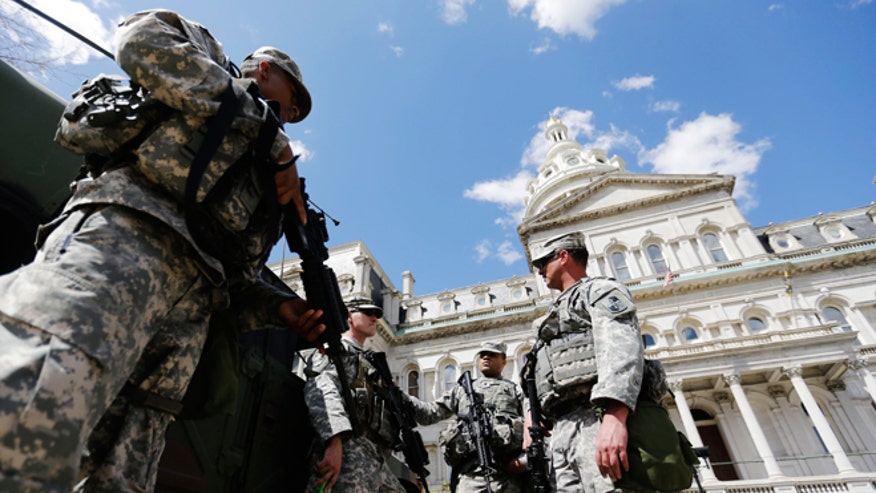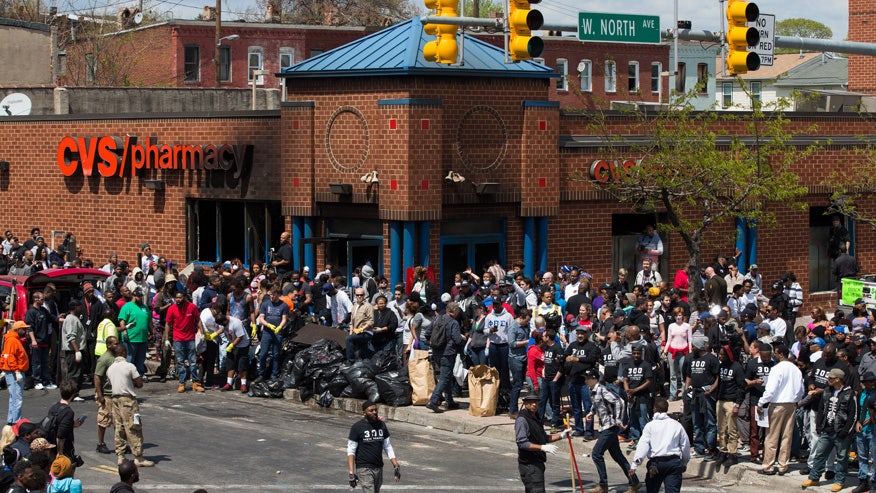People have the right to protest, but too many politicians are afraid or unwilling to stop looting and rioting. The dividing line between liberals and conservatives could hardly be starker.
When the St. Louis Grand Jury reached its decision in Officer Wilson’s shooting of Michael Brown, Democrat Missouri Governor Jay Nixon ignored calls from Ferguson’s mayor and kept the National Guard away from the initial violence. As Lt. Gov. Peter Kinder complained: “[The National Guard]were kept away at the crucial time while Ferguson burned.” The rioting and destruction was hardly a surprise.
Likewise, in Baltimore, Mayor Stephanie Rawlings-Blake has evoked controversy over her own slow response to the violence. She claims that she was misunderstood when she announced on Saturday: “I worked with the police and I instructed them to do everything that they could to ensure that the protestors could exercise their right to free speech. It is a very delicate balancing act because while we tried to make sure that they were protected from the cars and the other things that were going on, we also gave those who wished to destroy space to do that as well. And we worked very hard to keep that balance and to put ourselves in the best position to de-escalate.”
Rawlings-Blake may not have meant what she said about giving “those who wished to destroy space to do that,” but her statement was clear enough. In addition, her pattern of slow responses continued through Monday. Despite all the damage, the mayor didn’t even put in the required request for the National Guard until 7 PM Monday evening.
Reportedly the mayor and police commissioner thought that they had the situation under control and worried that the National Guard would provoke the rioters. Now it appears that police were ordered to “stand down” when riots broke out on Monday night.
“When the mayor called me, which quite frankly we were glad that she finally did, instantly we signed the executive order. We already had our entire team prepared,” Governor Hogan said. “We were trying to get in touch with the mayor for quite some time, she finally made that call and we immediately took action.”
Besides the National Guard, the governor deployed 500 state troopers and asked for another 5,000 officers from neighboring states to help.
Milwaukee Sheriff David Clarke lamented the mayor’s “total capitulation to these rioters and looters . . . appeasement has never worked anywhere in the United States as a strategy.” Clarke’s point is simple: if criminals think they can loot freely, they will loot.
It is hardly surprising that both Missouri Governor Nixon and Mayor Rawlings-Blake have spoken out against the “militarization” of police. Rawlings-Blake wants it limited “to a terrorist threat or after a natural disaster…. We don’t ever think about using the equipment we have against our own citizens, certainly not because they were exercising their first amendment rights.”
Armored vehicles, body armor, and shields might look threatening, but they keep police safe. In Baltimore, there is a “credible threat” that local gangs are targeting police for murder. Young rioters are hurling rocks and bottles at police. But you can’t expect police to do their job and hold the line against rioters if they fear being maimed or killed.
Indeed, fifteen police were injured during riots on Monday, with two still requiring hospitalization.
The ultimate irony is that politicians who are so careful to give “those who wished to destroy space to do that” are making life exceeding difficult for the law-abiding poor who live in the areas being destroyed. Many businesses looted and burned down aren’t likely to re-open, and the ones that survive will face dramatically higher insurance premiums. The result is fewer jobs and higher prices.
When Democratic Representative Elijah Cummings from Baltimore called on the rioters to stop, he warned: “After all the cameras are gone, we still have to live here.” The costs of slowly responding to rioters are something that many poor blacks in Baltimore will be living with for years to come.
John R. Lott, Jr. is a columnist for FoxNews.com. He is an economist and was formerly chief economist at the United States Sentencing Commission. Lott is also a leading expert on guns and op-eds on that issue are done in conjunction with the Crime Prevention Research Center. He is the author of eight books including “More Guns, Less Crime.” His latest book is “Dumbing Down the Courts: How Politics Keeps the Smartest Judges Off the Bench” Bascom Hill Publishing Group (September 17, 2013). Follow him on Twitter@johnrlottjr.



